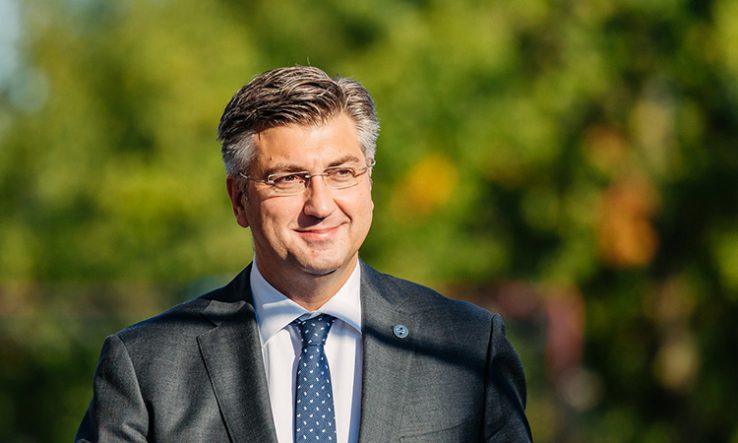
Image: Estonian Presidency [CC BY 2.0], via Flickr
Fallout is ongoing from disagreements on seriousness of pandemic and best mitigation measures
A group set up to advise Croatia’s prime minister Andrej Plenković on the Covid-19 pandemic has been thrown into confusion following a high-profile falling-out among members, and between some members and the government.
The 15-member group of politicians, heads of public institutions and scientists has been meeting once a month, with Plenković in attendance, since it was set up in the spring. It includes scientists that the prime minister’s team deemed the best of Croatia’s experts, whether working in the country or abroad.
But as Croatia’s Covid-19 case rate rose rapidly in recent weeks, a major split emerged within the advisory group over how much worse the situation could get and how much tougher the response measures should be.
Five of the group’s members co-signed an open letter to the public on 9 December together with 21 other experts, calling for tougher response measures. This triggered phone calls from the PM’s office, which some members told local media meant they had been dismissed from the group. The government later claimed there had been a misunderstanding and this was not the case.
The five experts who signed the letter included UK-based Igor Rudan, director of the Centre for Global Health Research at the University of Edinburgh, and Petra Klepac, assistant professor of infectious disease modelling at the London School of Hygiene and Tropical Medicine, as well as Swiss-based Nenad Ban, professor of molecular biology at the Swiss Federal Institute of Technology.
In their letter, the experts warned of the “intensive spread of infection” and that Croatia risked “losing control over the epidemic”. They called for more testing, better data and communication, and more support for hospitals and epidemiologists.
A few days after signing the letter, Ban told Research Professional News that he and several other members of the group answered phone calls from Plenković’s chief of staff, which “indicated that [their] continued participation in the scientific advisory board does not make sense”.
According to local media reports, in a press conference Plenković’s chief of staff expressed disappointment that the advisory group’s members signed the letter without telling the government first, and said the government was considering the way forward for the group.
But the government later said in a press statement that there was a misunderstanding and that the members of the group had not been dismissed. The government did not respond to a request for comment from Research Professional News.
“I have also in the meantime received a phone call from the chief of staff to this effect,” Ban told Research Professional News, regarding his not being dismissed. “My response, and the response of all my colleagues who were contacted, was that in the interest of helping Croatia in this difficult situation, we will continue advising the government with the goal of controlling and suppressing the pandemic.”
But no meetings of the group have been held since the falling out, and it is not clear when the group will meet again. Some sources have expressed concern about whether this will even happen.
Igor Stagljar, a professor at the Department of Molecular Genetics of the University of Toronto, Canada, who is not a group member but has been following the situation closely, told Research Professional News the government refused to listen to seven of the group’s scientists, who have been calling for stricter measures since the number of infections began to rise sharply in October, and instead listened to those “who relativised the seriousness of the epidemic”.
He claimed that “some members of this scientific council completely distort the facts and ‘beautify’ the epidemiological situation, which is not at all brilliant”. Stagljar said: “The government did not listen to real experts in the field who got upset because of this and therefore decided to sign a document along with 20 other eminent Croatian scientists.”
Stagljar described the government’s apparent dismissal of the scientists as “amateurish and hasty”, and said what looked like a quick reversal was “apparently due to the fierce reaction of the entire scientific community”.
He said: “I thought Croatia is a democratic state where it is allowed—in a completely apolitical appeal to the citizens and the government of the Republic of Croatia—to point out our concerns about the current state of the pandemic, as well as the fact that the government is currently not communicating the true state of affairs regarding the pandemic.”
Another close follower of the situation who is not a member of the group, Ivan Dikic, director of the Institute of Biochemistry II at Goethe University Frankfurt, said: “The situation is not clear at the moment if and how this scientific advisory body will continue with the work.”
A further issue for the group is allegations, made in an open letter to the prime minister by Dikic, that conflicts of interests of the group members have not been regulated properly. Dikic claimed that some of the members who are heads of private institutions are in a “classic conflict of interest”, including Gordan Lauc, professor of molecular biology and glycobiology at the University of Zagreb, who is founder and chief executive of Genos, an analytical chemistry company.
But Lauc denied having any conflict of interest. “In my conflict of interest statement to the committee I stated that I could potentially be in a conflict of interest if my company Genos would get involved in testing for Covid-19,” he told Research Professional News. “Until now Genos was not involved and there are no plans to get involved in any Covid-19 related testing. I was only fully disclosing everything and this statement was leaked to media and misinterpreted as a conflict of interest.”